|
|
||
|
|
|---|
|
|
||
|
|
|---|
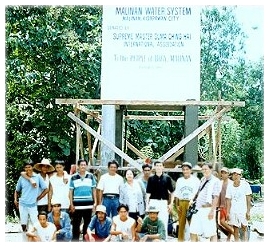 |
Director Zaida J. Rinsulat (middle back row) of the Philippines Social Welfare Department, and local residents pose for a photo in front of a water tower in Malinan Village, Cotabato Province, the Philippines, that was built from the contribution that came from Master. |
On behalf of Supreme Master Ching Hai, a representative presents a contribution of US$100,000 to Senator Heherson Alvarez (middle) in response to his request for assistance in environmental protection and enhancement of people's lives. |
![]() Philippines
Senator Heherson Alvarez was planning to carry out a reforestation and soil
preservation project in rural Dallaw in the Cordon area of Isabela Province,
which would incidentally create job opportunities and raise the standard of
living for local residents.
Philippines
Senator Heherson Alvarez was planning to carry out a reforestation and soil
preservation project in rural Dallaw in the Cordon area of Isabela Province,
which would incidentally create job opportunities and raise the standard of
living for local residents.
![]() Senator Alvarez
has read Master's books and News magazines and watched Her videotaped lectures.
He is deeply impressed by Her. For many years, he and his wife, Mrs. Cecile
Guidote, have been committed to promoting environmental protection and using
art as a form of education to help handicapped children become confident, capable
and creative. When we visited the Senator at his office, he asked us to forward
to Master, on his behalf, a book on ecological and environmental conservation,
and a magazine carrying a news report on his and his wife's work on environmental
protection and care for handicapped people. The couple is deeply concerned about
the potential disasters that a climate change could bring to humankind if the
ecology and environment are left unprotected and pollution continues unabated
around the globe. They have elicited strong interest among Philippine young
people to protect the Earth, and have tried to draw government attention to
the need for environmental protection with the alarming warning that continued
destruction of the environment could lead to disaster, destroy farms, and ruin
the economy. What is even worse, it could put the country and its people in
jeopardy.
Senator Alvarez
has read Master's books and News magazines and watched Her videotaped lectures.
He is deeply impressed by Her. For many years, he and his wife, Mrs. Cecile
Guidote, have been committed to promoting environmental protection and using
art as a form of education to help handicapped children become confident, capable
and creative. When we visited the Senator at his office, he asked us to forward
to Master, on his behalf, a book on ecological and environmental conservation,
and a magazine carrying a news report on his and his wife's work on environmental
protection and care for handicapped people. The couple is deeply concerned about
the potential disasters that a climate change could bring to humankind if the
ecology and environment are left unprotected and pollution continues unabated
around the globe. They have elicited strong interest among Philippine young
people to protect the Earth, and have tried to draw government attention to
the need for environmental protection with the alarming warning that continued
destruction of the environment could lead to disaster, destroy farms, and ruin
the economy. What is even worse, it could put the country and its people in
jeopardy.
![]() During our visit,
Senator Alvarez contacted the natural environmental resources department of
Isabela Province and gave us the local contact phone number and address. The
next day, we arrived at this government agency and met with the relevant authorities,
who assigned a special escort to guide us on our field visit. We ferried across
River Magat, over which reservoirs and dams have been built to generate electricity
and supply people with water for drinking and irrigation. After a halfhour trip,
we arrived on the opposite bank of the river. The first thing that caught our
eyes was a lone, dilapidated hut surrounded by a vast expanse of land lying
against a backdrop of overlapping layers of mountains. The hut was the rest
area for local farmers, who came to plant tree cuttings in the plot of land
in front of the hut and, when new leaves had sprouted, transplanted them on
the plains or hill slopes. By so doing, the farmers could earn a living while
conserving the land around the reservoir. We spent the night at a hotel. The
following day, we met with the mayor of Cordon and rode in a jeep to inspect
the hilly region.
During our visit,
Senator Alvarez contacted the natural environmental resources department of
Isabela Province and gave us the local contact phone number and address. The
next day, we arrived at this government agency and met with the relevant authorities,
who assigned a special escort to guide us on our field visit. We ferried across
River Magat, over which reservoirs and dams have been built to generate electricity
and supply people with water for drinking and irrigation. After a halfhour trip,
we arrived on the opposite bank of the river. The first thing that caught our
eyes was a lone, dilapidated hut surrounded by a vast expanse of land lying
against a backdrop of overlapping layers of mountains. The hut was the rest
area for local farmers, who came to plant tree cuttings in the plot of land
in front of the hut and, when new leaves had sprouted, transplanted them on
the plains or hill slopes. By so doing, the farmers could earn a living while
conserving the land around the reservoir. We spent the night at a hotel. The
following day, we met with the mayor of Cordon and rode in a jeep to inspect
the hilly region.
![]() Meanwhile, one
of our fellow initiates was on a trip to Mindanao. This second largest island
in the Philippines archipelago had suffered a severe drought that destroyed
all its crops in July 1998. In response to a request by Cotabato Province's
social welfare department, Master compassionately promised to build a water
supply system for the more than two hundred households in Malinan Village. With
Master's permission, I flew to Mindanao, where brother Nguyen and I met with
Director Zaida J. Rinsulat at the social welfare office. When she learned that
Master had sent us to help resolve the water problem, she immediately arranged
to take us to the area.
Meanwhile, one
of our fellow initiates was on a trip to Mindanao. This second largest island
in the Philippines archipelago had suffered a severe drought that destroyed
all its crops in July 1998. In response to a request by Cotabato Province's
social welfare department, Master compassionately promised to build a water
supply system for the more than two hundred households in Malinan Village. With
Master's permission, I flew to Mindanao, where brother Nguyen and I met with
Director Zaida J. Rinsulat at the social welfare office. When she learned that
Master had sent us to help resolve the water problem, she immediately arranged
to take us to the area.
![]() As we drove along
the narrow paths, we saw withered crops in the fields. Director Rinsulat told
us that the crops had died from a shortage of water; farmers had been forced
to abandon their land and move to other places to make a living. The people
in that area were so poor that they did not have the money to dig wells or build
irrigation canals. All they could do was pray to God for help. From the river
to their home was a long distance along rugged paths that were exhausting enough
to travel empty-handed, let alone while carrying a 20-liter-bucket of water!
Ms. Rinsulat guided us directly to the water source for an inspection. Along
the way, she exchanged greetings with the local inhabitants. She told us stories
of children returning home with empty buckets because they were so thirsty trudging
uphill that they would drink all the water that they had fetched. It made me
sigh to see naked children waddling up the hill carrying a small bucket of water
in their hands.
As we drove along
the narrow paths, we saw withered crops in the fields. Director Rinsulat told
us that the crops had died from a shortage of water; farmers had been forced
to abandon their land and move to other places to make a living. The people
in that area were so poor that they did not have the money to dig wells or build
irrigation canals. All they could do was pray to God for help. From the river
to their home was a long distance along rugged paths that were exhausting enough
to travel empty-handed, let alone while carrying a 20-liter-bucket of water!
Ms. Rinsulat guided us directly to the water source for an inspection. Along
the way, she exchanged greetings with the local inhabitants. She told us stories
of children returning home with empty buckets because they were so thirsty trudging
uphill that they would drink all the water that they had fetched. It made me
sigh to see naked children waddling up the hill carrying a small bucket of water
in their hands.
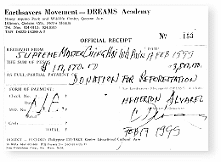 |
The
receipt for the US$100,000 contribution for the water and soil conservation project in Isabela Province, the Philippines. |
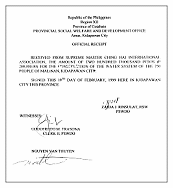 The receipt for the 200,000 peso (US$5,263) contribution for the construction of the water supply system. |
|
![]() After we returned to
the social welfare department, I gave Director Rinsulat a check and asked that
the project commence as soon as possible. She stared at the check in disbelief
and called her staff members to come and take a look at it, saying, "All
this time, we have been wanting to build a water supply system for Malinan Village.
We have requested help from the government but three months have passed and
we still haven't received an answer. We never expected that someone from Formosa
would come to help us." Then she added, "God must have sent you. Hes
has heard our prayers." I replied, "Master is a representative of
God, and I am here solely because of Her compassion; She has sent this money
for your good use. She is aware of your needs." Some of Master's sample
booklets were presented to the director, which she held carefully and attentively
read.
After we returned to
the social welfare department, I gave Director Rinsulat a check and asked that
the project commence as soon as possible. She stared at the check in disbelief
and called her staff members to come and take a look at it, saying, "All
this time, we have been wanting to build a water supply system for Malinan Village.
We have requested help from the government but three months have passed and
we still haven't received an answer. We never expected that someone from Formosa
would come to help us." Then she added, "God must have sent you. Hes
has heard our prayers." I replied, "Master is a representative of
God, and I am here solely because of Her compassion; She has sent this money
for your good use. She is aware of your needs." Some of Master's sample
booklets were presented to the director, which she held carefully and attentively
read.
![]() While the project was
underway, Filipino journalist Mr. Santos accompanied us on a visit to Alvarez's
home. When we learned of his love for poetry, we presented him with Master's
poetry anthology "The Lost Memories". He knew that we were vegetarians
and invited us to a vegetarian meal at the local restaurant. On our second visit
to his home, we presented him with a US$100,000 check contribution from Master.
We also brought with us a few vegetarian dishes which we all enjoyed.
While the project was
underway, Filipino journalist Mr. Santos accompanied us on a visit to Alvarez's
home. When we learned of his love for poetry, we presented him with Master's
poetry anthology "The Lost Memories". He knew that we were vegetarians
and invited us to a vegetarian meal at the local restaurant. On our second visit
to his home, we presented him with a US$100,000 check contribution from Master.
We also brought with us a few vegetarian dishes which we all enjoyed.
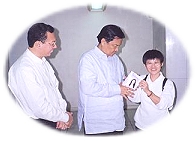 |
|
|
Sharing
Master's poetry anthology with Senator Alvarez, a poetry lover.
|
![]() Although the Malinan
water supply project was scheduled to be completed in a month's time, the people's
concerted effort shortened the work time by about half. Two water towers were
built - one at the river's source to collect uncontaminated spring water flowing
from between the rocks, and the other on level ground conveniently accessible
to the people. The water towers were connected by pipes and the water was driven
by electric pumps. Since the follow-up project needed additional funding, a
second visit to this island was required. Director Rinsulat of the social welfare
department mentioned with great enthusiasm that the Malinan residents were overjoyed
and grateful to Master. They had painted Her name on the water towers. A child
had told her that the water system was a dream come true. She gave me a letter
and thanked Master and the initiates on behalf of the beneficiaries. The water
supply system was extremely important to them, she reiterated, for it would
ensure good harvests. This is not something that those of us who access water
simply by turning on the tap can easily understand.
Although the Malinan
water supply project was scheduled to be completed in a month's time, the people's
concerted effort shortened the work time by about half. Two water towers were
built - one at the river's source to collect uncontaminated spring water flowing
from between the rocks, and the other on level ground conveniently accessible
to the people. The water towers were connected by pipes and the water was driven
by electric pumps. Since the follow-up project needed additional funding, a
second visit to this island was required. Director Rinsulat of the social welfare
department mentioned with great enthusiasm that the Malinan residents were overjoyed
and grateful to Master. They had painted Her name on the water towers. A child
had told her that the water system was a dream come true. She gave me a letter
and thanked Master and the initiates on behalf of the beneficiaries. The water
supply system was extremely important to them, she reiterated, for it would
ensure good harvests. This is not something that those of us who access water
simply by turning on the tap can easily understand.
![]() At the completion
of the water supply system, the Filipino newspapers had also reported that the
Moslems and Christians on this island had agreed to a cease-fire under military
mediation. This was a good sign. It seemed to say that God's divine water had
extinguished the raging flames of war and washed away the desires and persistent
longing for power, fame and fortune that had long shrouded the souls of humankind.
At the completion
of the water supply system, the Filipino newspapers had also reported that the
Moslems and Christians on this island had agreed to a cease-fire under military
mediation. This was a good sign. It seemed to say that God's divine water had
extinguished the raging flames of war and washed away the desires and persistent
longing for power, fame and fortune that had long shrouded the souls of humankind.

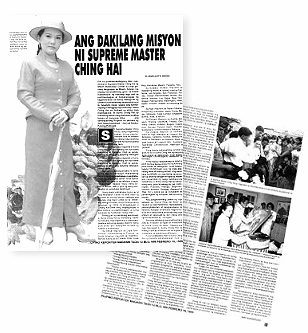 |
|
'The
Reporter', a Philippino journal,
|
![]()